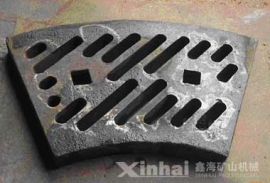In mineral processing, to make valuable ores realize single separation, ores must be crushed and grinded into powdery materials. In the process of crushing, all kinds of crushers are used, while a variety of ball mills, rod mills and autogenous mills(or semi-autogenous mills) are available in the process of grinding. Ball mills and rod mills take steel balls and steel bars as their medium, but on the contrary, autogenous mills make ores themselves be a medium. An autogenous mill is featured by combining mid-fine crushing with coarse grinding. Ores can be crushed and grinded through mutual impact and grinding with themselves as grinding media. This machine can produce -0.074mm ores which accounts for 20%-40% of total amount. The comminution degree can be 4000-5000, ten times higher than ball mills and rod mills.
Before in the 1950s, conventional autogenous mills was still in the stage of small specifications, low production and low efficiency. Till the 1960s to 1970s, it started up large-scale development. However, due to the limitation of structure, the processing capacity of the unit power consumption is low. As a result, it had not been widely used due to the large volume and difficult transportation.
After reform and openness, with rapid development of mining construction and technical advancement, autogenous mills are widely used. In recent years, we have been devoting to lowering energy consumption and improving grinding efficiency and utilization. Xinhai superfine lamination autogenous mill is a representative of new autogenous mills.
Xinhai has improved its structure. The transmission slowly rotates and materials are fed in from one side. Then, the ores are crushed by action of its own impact and autogenous mill in the cylinder. Those qualified materials are forced to discharge through the grizzly screen by action of overflow water.
This machine has remarkable discharging effects. Under the circumstance that maximum particle size is 160mm. The particle sizes are as follows: -200 mesh accounts for 45%; +200 mesh~to 2mm accounts for 45%; -2mm~6mm accounts for 8%; +6mm~10mm accounts for 2%. With 217.39% processing capacity of conventional ball mills, the products(-200 mesh for 45%) enter for classification and skip ball mill and directly enter next processing stage. During the feeding process of ball mill, ore liquid of +6mm~10mm is less than 2%, and the rest is eligible +200 mesh~6mm. In addition, this machine is energy-saving and environmental, featured by saving civil investment and floor area, shortening the construction cyclone and saving 60% power consumption. Thus, the processing capacity has been greatly improved.


 marketing@ytxinhai.com
marketing@ytxinhai.com  0086 13810327080
0086 13810327080 






































































































 CHAT
CHAT MESSAGE
MESSAGE




